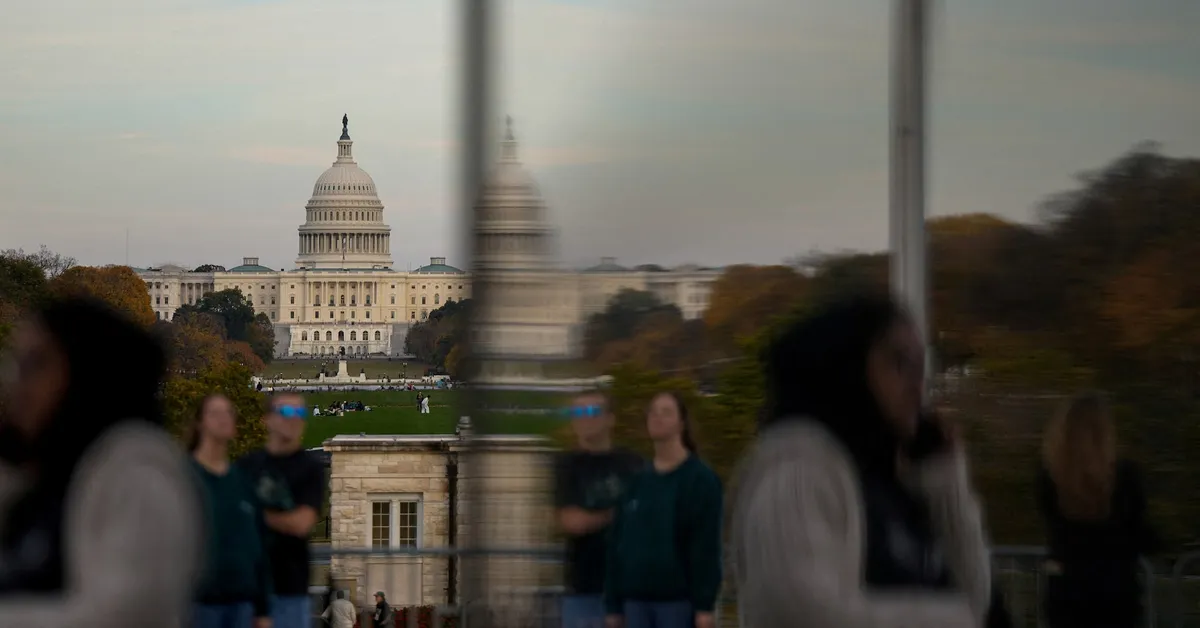
As of November 4, the U.S. government shutdown has officially reached its 35th day, tying the record set during President Donald Trump's first term for the longest shutdown in history. This ongoing stalemate has seen both Republicans and Democrats in Congress exchanging blame for the deadlock, with significant repercussions for millions of Americans.
The consequences of the government shutdown are escalating daily. For the first time, food assistance for low-income families has been halted, leaving many in precarious situations. Federal employees, including airport security personnel, law enforcement agents, and military members, are working without pay. Additionally, the economy is facing uncertainty due to the lack of government data reporting.
In Congress, the Senate has rejected a stopgap funding measure passed by the House of Representatives more than a dozen times, with no lawmakers changing their stances. Although Trump's Republicans hold a 53-47 majority in the Senate, they require at least seven Democratic votes to meet the chamber's 60-vote threshold for most legislation. However, Democrats are withholding their support to negotiate an extension of healthcare insurance subsidies.
Republican Senate Majority Leader John Thune expressed concern over the continuing impact of the shutdown, questioning how long Democrats are willing to prolong this situation. In contrast, Chuck Schumer, the Democratic leader, criticized Trump for his distractions, pointing out that while the former president focuses on remodeling the White House, everyday Americans are increasingly worried about their healthcare affordability for the upcoming year.
Despite the stalemate, there are whispers of progress in closed-door talks between the two parties. This shutdown, the 15th since 1981, is notable not just for its duration but also for reversing the traditional partisan dynamics, with little effort made to resolve the crisis. The House has not been in session since September 19, and Trump has frequently left Washington during this crucial period.
The Trump administration announced on Monday that it would partially fund November food benefits, although it warned that the distribution could take weeks or months. Additionally, funding for Head Start early learning programs for low-income children has been jeopardized due to the lack of new funding since November 1.
Federal workers, including those in law enforcement and military roles, are now missing paychecks, which has resulted in staffing shortages and travel delays at airports. An airline group reported that over 3.2 million air passengers have experienced delays or cancellations since the shutdown began. The Congressional Budget Office estimates that if the shutdown continues for another week, it could cost the U.S. economy an estimated $11 billion.
Throughout the shutdown, Trump has directed his attention to foreign policy issues, ranging from Gaza to Russia to Asia. However, he has also started advocating for the abolition of the Senate's 60-vote filibuster threshold, arguing that this could help Republicans push through legislation. In a recent interview with CBS's *60 Minutes*, Trump stated he would not negotiate under pressure from Democrats, emphasizing his position that any agreement must be beneficial for Republicans.
Thune has consistently opposed the idea of eliminating the filibuster. Recent polling from Reuters/Ipsos indicates that public sentiment assigns blame for the shutdown to both parties, with 50% of respondents attributing most of the blame to Republicans and 43% to Democrats. Some moderate Democratic senators have sided with Republicans in efforts to reopen the government, suggesting that the immediate negative impacts of the shutdown outweigh potential long-term gains from their stance.
Democrats are also holding out for concessions from Republicans, aiming to reaffirm congressional funding powers amid concerns about Trump's executive overreach. As Senator Andy Kim of New Jersey noted, the longstanding trust deficit stemming from Trump's actions complicates any negotiations, raising questions about the reliability of potential agreements.